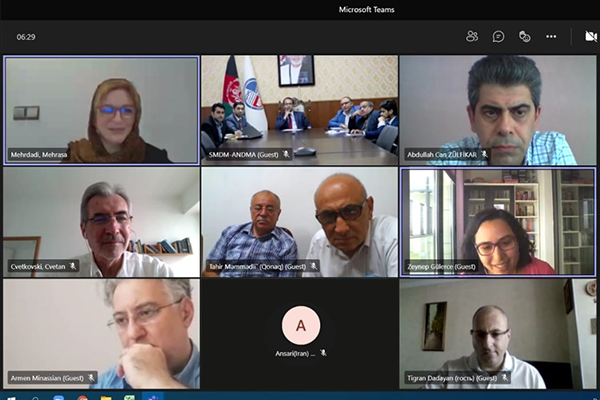


On June 27, 2021, at the invitation of the International Institute of Earthquake Engineering and Seismology (IIEES) of the Ministry of Science, Research and Technology of the Islamic Republic of Iran, the National University of Architecture and Construction of Armenia, as an academic partner-university, participated in the Virtual Meeting on “Feasibility Study on Establishment of Regional Earthquake Monitoring Systems (REMS) and Developing Quick Damage and Loss Assessment System in Central and West Asia.”
The representatives of the NUACA were Vardges Yedoyan, Vice-Rector for International Relations, Manuk Barseghyan, Vice-Rector for Scientific Affairs, Tigran Dadayan, Head of the Chair of Building Structures, Armen Minassian, Advisor to the Vice-Rector for International Relations and Sos Margaryan, Acting Director of the “Territorial Seismic Protection Service” SNCO of the RA Ministry of Emergency Situations.
In accordance with the agreement signed between the International Institute of Earthquake Engineering and Seismology (IIEES) of the Ministry of Science, Research and Technology of the Islamic Republic of Iran and UNESCO, Regional Education and Research Center on Earthquake Risk Management and Resilience for West and Central Asia was established at the named Institute, and the main goals of it are:
· Carry out research and studies in key areas of earthquake risk mitigation and management to promote a better understanding of the risks caused by earthquakes,
· Contribute to the elaboration and development of disaster risk mitigation policy by taking actions such as assisting Governments in developing disaster risk and impact mitigation policies, including risk reduction, preparation, post-disaster needs assessment, damage studies, post-disaster reconnaissance missions, assessment of physical, functional and economic losses, social consequences of disasters, planning of reconstruction of disaster-affected areas and protection measures,
· Promote education and training at different levels for the transfer of knowledge in the field of earthquake risk management,
· Contribute to the development, implementation and improvement of technical regulations, standards and guidelines in the field of disaster risk reduction,
· Carry out research and development of advanced methods, techniques and tools for earthquake loss assessment, rapid response, decision support,
· Promote the culture of risk prevention, community awareness through organization of workshops, seminars, trainings, debates and other events as well as publications,
· Provide services: consultation, expert studies, technical advice, etc,
· Participate in regional partnerships and networks dedicated to collection and dissemination of relevant information and knowledge on earthquake risk reduction and management.
Taking into consideration that our country is in a high seismic risk zone, such international cooperation, effective participation in events, as well as the application of current international experience is very important.